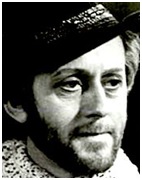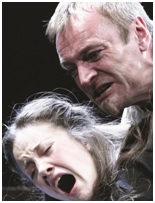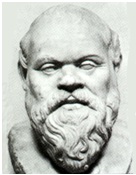|
 |
|
 |
|
|
||
Shakespeare's Measure for Measure -
Leadership and Ethics
Measure for Measure
Key characters Duke Vincentio, the ruler of Vienna in Austria. Angelo, his deputy. Claudio, a young gentleman. Isabella, Claudio’s sister and a novice nun. Mariana, Angelo’s ex-fiancée.
Fun facts
The story Vienna is a lawless and immoral city. Its ruler, Duke Vincentio (Kenneth Colley, pictured right, in a 1979 production) leaves his strict, puritanical deputy, Angelo, in charge to re-introduce law and order. But really he wants to observe Angelo’s actions disguised as a friar. Angelo immediately announces:
So Claudio:
In desperation he sends his friend, Lucio, to ask his sister Isabella (who has just entered a convent) to plead his case with Angelo. Initially Angelo is unmoved by her arguments but is gradually won over by her virtue, courage and beauty. He says he will save her brother, only if he has sex with her. She is outraged and threatens to tell everyone but realizes that nobody will believe her. Isabella:
(Isabella, Andrea Riseborough, and Angleo, Richard Dormer, are pictured right in a 2006 production) The Duke (in disguise) suggests a solution. Angelo must have sex with his ex-fiancée, Mariana, disguised as Isabella. This works but Angelo still wants Claudio executed. The Duke (still in disguise) persuades the Provost (the prison chief) to:
The Duke:
Mariana then claims that she and Angelo must marry, because they’ve had sex. The Duke re-appears in disguise confirming Mariana's story but is accidentally unmasked. Angelo:
After Mariana’s plea for mercy, the Duke pardons him on condition he marries Mariana. The Duke:
Lessons on leadership and ethics 1. You often get what you deserve The play’s title comes from Jesus’ Sermon on the Mount: “With what measure you mete (i.e. give out), it shall be measured to you again” In other words, you reap what you sow. For example, Angelo’s wrongdoings come back to haunt him when he realizes the Duke knows about them. He is only saved by the Duke’s:
2. Don’t judge people If you judge people (like Angelo did with Claudio and Juliet), you will also be judged for your wrongdoings.
3. Don’t be hypocritical Angelo is a hypocrite, because he is outwardly moral but corrupt and unjust. He has extra-marital sex, even though he’s prepared to execute Claudio for it! 4. Change quickly but fairly Vienna was lawless and needed quick, harsh measures to bring back order. So the Duke let his tough guy deputy, Angelo, take over. If people aren’t punished for their crimes, punishment is no longer a deterrent. “In time the rod becomes more mocked than feared”, the Duke says. But Angelo is an unsuccessful leader, because he is:
“It is excellent to have a giant’s strength, but it is tyrannous to use it like a giant”, Isabella advises Angelo.
5. Be principled but pragmatic Isabella wins the respect of Angelo and the Duke with her integrity and
courage to defend her principles of:
Angelo pays for his unprincipled behaviour, but what about the Duke? His idea of swapping Mariana for Isabella is also deceitful and perhaps immoral. But he shrugs off any thought of wrongdoing by saying “the offence pardons itself” This suggests he is prepared to bend his principles, when it suits him.
6. Delegation can be dangerous Giving Angelo the leader’s job was a disaster. The Duke can also be criticized for:
7. Morality is about people Ethics and the law must serve people. Angelo says to Isabella that you can’t “condemn the fault [i.e. the crime] and not the actor [i.e. the perpetrator] of it”. In response she attacks the
8. People need hope and love “The miserable have no other medicine, but only hope”, Claudio says about his chances of a pardon. Love and forgiveness are also continual themes throughout the play. For example, Mariana accepts and forgives Angelo’s faults, seeing him as a better person for his repentance and remorse.
9. Accept people's weaknesses Accept people's weaknesses and forgive, if they're penitent (as the Duke forgave Angelo). 10. Know that you know nothing Like the Greek philosopher, Socrates (pictured right), Isabella suggests that accepting your ignorance is the cause of wisdom: “Let me be ignorant and in nothing good, but graciously to know I am no better”, she says.
Key quotes on leadership It is excellent to have a giant’s strength, but it is tyrannous to use it like a giant, Isabella.
Key quote on motivation In time the rod becomes more mocked than feared, the Duke.
Key quote on death The sense of death is most in apprehension, Isabella.
Key quotes on success Our doubts are traitors, and make us lose the good we oft might win, by fearing to attempt, Lucio. They say, best men are moulded out of faults, Mariana.
Key quote on positive thinking The miserable have no other medicine, but only hope, Claudio.
Key quotes on ethics Virtue is bold, and goodness never fearful, the Duke. Some rise by sin, and some by virtue fall, Escalus (Angelo’s wise adviser).
Key quote on learning and wisdom Let me be ignorant and in nothing good, but graciously to know I am no better, Isabella. |
|
|
||
|
|
||
| Copyright © wisdomtowin.com 2025 All Rights Reserved | ||
|














